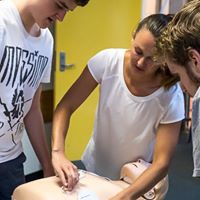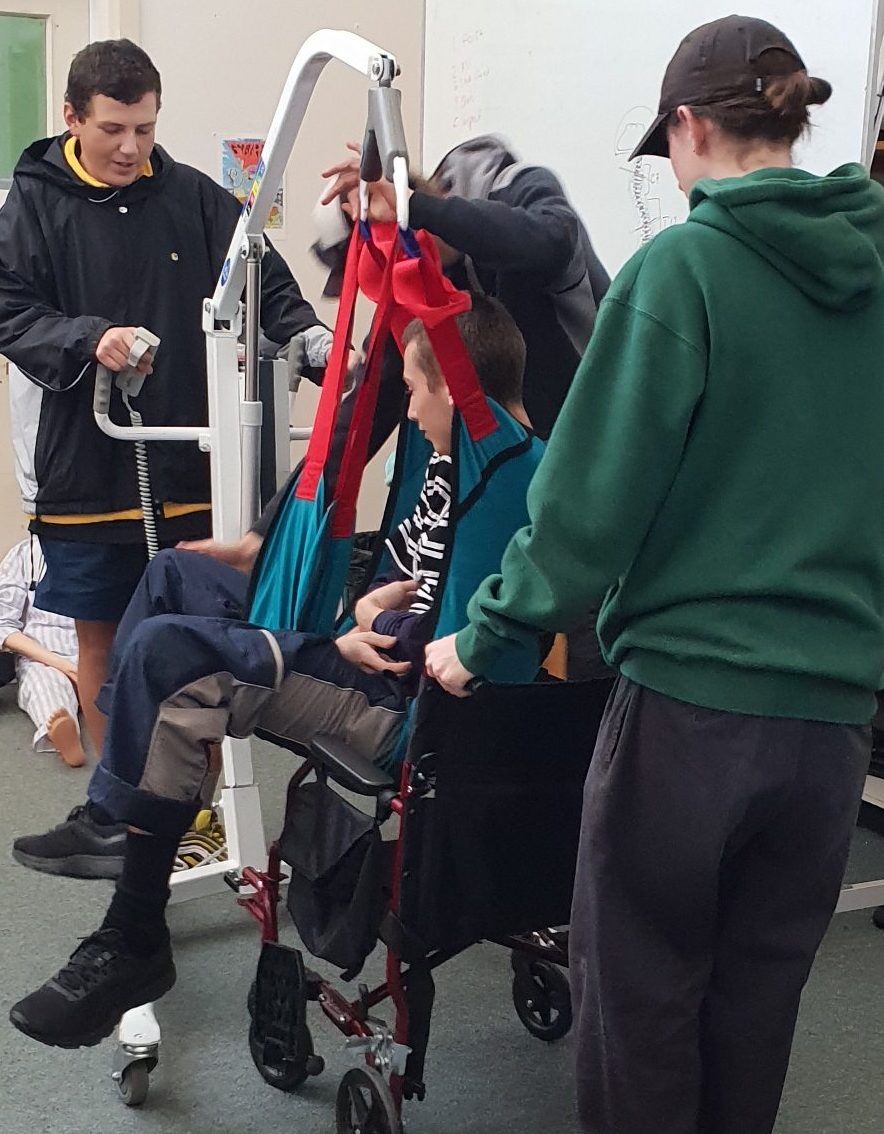- Teacher: Samantha Andraos
- Teacher: Lisa Clough
- Teacher: David Griffiths
- Teacher: DIMITY LEECH
- Teacher: Jennie Mifsud
- Teacher: Lorraine Owen
Available courses
This unit describes the skills and knowledge required to perform cardiopulmonary resuscitation (CPR) in line with the Australian Resuscitation Council (ARC) guidelines.
This unit applies to all persons who may be required to provide CPR, in a range of situations, including community and workplace settings.

- Teacher: David Griffiths
- Teacher: Kim Zvirbulis
This unit describes the skills and knowledge required to provide a first aid response to a casualty in line with first aid guidelines determined by the Australian Resuscitation Council (ARC) and other Australian national peak clinical bodies.
The unit applies to all persons who may be required to provide a first aid response in a range of situations, including community and workplace settings.
Specific licensing/regulatory requirements relating to this competency, including requirements for refresher training should be obtained from the relevant national/state/territory Work Health and Safety Regulatory Authorities.

- Teacher: Samantha Andraos
- Teacher: David Griffiths
- Teacher: Jennie Mifsud
This unit describes the performance outcomes, skills and knowledge required to use personal hygiene practices to prevent contamination of food that might cause food-borne illnesses. It requires the ability to follow predetermined organisational procedures and to identify and control food hazards.
The unit applies to all organisations with permanent or temporary kitchen premises or smaller food preparation or bar areas.
This includes restaurants, cafes, clubs, hotels, and bars; tour operators; attractions; function, event, exhibition and conference catering; educational institutions; aged care facilities; correctional centres; hospitals; defence forces; cafeterias, kiosks, canteens and fast food outlets; residential catering; in-flight and other transport catering.
It applies to food handlers who directly handle food or food contact surfaces such as cutlery, plates and bowls during the course of their daily work activities. This includes cooks, chefs, caterers, kitchen stewards, kitchen hands, bar, and food and beverage attendants, and sometimes room attendants and front office staff.
Food handlers must comply with the requirements contained within the Australia New Zealand Food Standards Code.
In some States and Territories businesses are required to designate a food safety supervisor who is required to be certified as competent in this unit through a registered training organisation.
Food safety legislative and knowledge requirements may differ across borders. Those developing training to support this unit must consult the relevant state or territory food safety authority to determine any accreditation arrangements for courses, trainers and assessors.
- Teacher: Samantha Andraos
- Teacher: DIMITY LEECH
- Teacher: Katrina Orr
This qualification reflects the role of workers who provide support for the effective functioning of health services. At this particular level, the certifictae will provide students the opportunity to gain employment within the health sector performing duties and tasks under supervision involving routines and procedures.
This course will give you the foundation skills necessary to work in an assistant role in a health, aged or residential care setting, or to undertake further study in the field. Australia's healthcare industry is a strong-growth sector with more than 50,000 jobs expected to open in the next five years.
Units of study:
- CHCDIV001 – Work with diverse people
- CHCCOM005 – Communicate and work in the health or community services
- HLTWHS001 – Participate in workplace health and safety
- HLTINF005 – Apply basic principles and practices of infection prevention & control
- CHCCCS020 – Respond effectively to behaviours of concern
- CHCCCS009 - Facilitate responsible behaviour
- HLTWHS005 – Conduct manual tasks safely
- CHCCCS010 - Maintain a high standard of service
- CHCCCS026 - Transport individuals
- CHCCCS012 - Prepare & maintain beds
- HLTHSS009 - Preform general cleaning tasks in a clinical setting
- BSBPEF202 - Plan and apply time management

- Teacher: Samantha Andraos
- Teacher: David Griffiths
- Teacher: DIMITY LEECH
- Teacher: Jennie Mifsud
- Teacher: Lorraine Owen
- Teacher: Kim Zvirbulis
HLT33115 – Certificate III in Health services assistance
This qualification reflects the role of a variety of workers who use a range of factual, technical and procedural knowledge to provide assistance to health professional staff for the care of clients. Health services assistance involves the worker in direct client contact under supervision.
Units of Study
Total number of units = 15
7 core units & 8 elective units, consisting of:
Core units
CHCCOM005 Communicate and work in health or community services
CHCDIV001 Work with diverse people
HLTAAP001 Recognise healthy body systems
HLTINF001 Comply with infection prevention and control policies and procedures
HLTWHS001 Participate in workplace health and safety
BSBMED301 Interpret and apply medical terminology appropriately
BSBWOR301 Organise personal work priorities and development
Elective units
CHCCCS002 Assist with movement
CHCCCS020 Respond effectively to behaviours of concern
CHCCCS026 Transport individuals
CHCCCS009 Facilitate responsible behaviour
CHCCCS010 Maintain a high standard of service
CHCPRP005 Engage with health professionals and the health system
HLTHPS001 Take clinical measurements
BSBFLM312 Contribute to team effectiveness

- Teacher: Samantha Andraos
- Teacher: ashley Carter
- Teacher: Lisa Clough
- Teacher: DIMITY LEECH
- Teacher: Jennie Mifsud
- Teacher: Lorraine Owen
- Teacher: Kim Zvirbulis